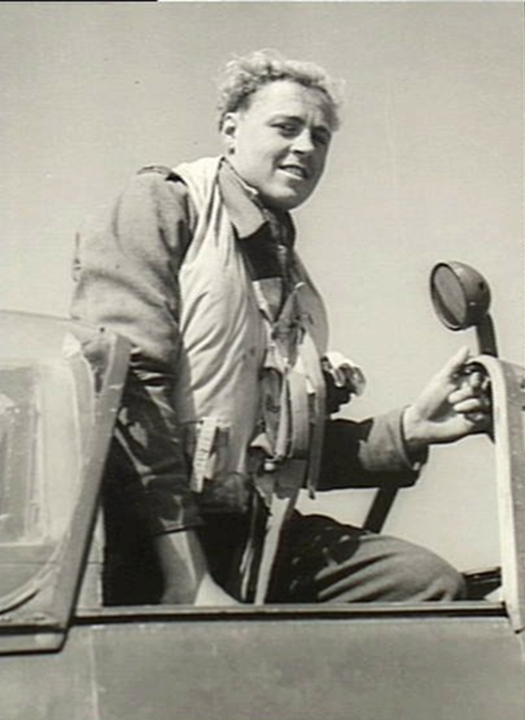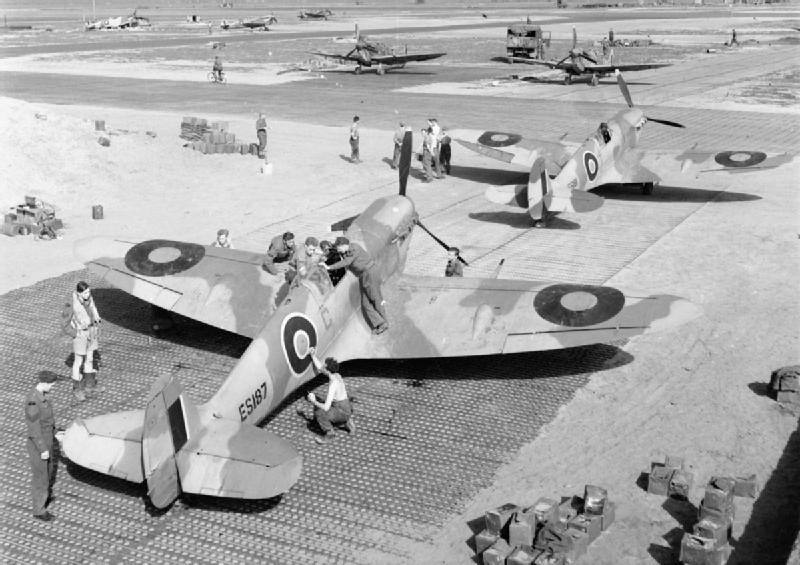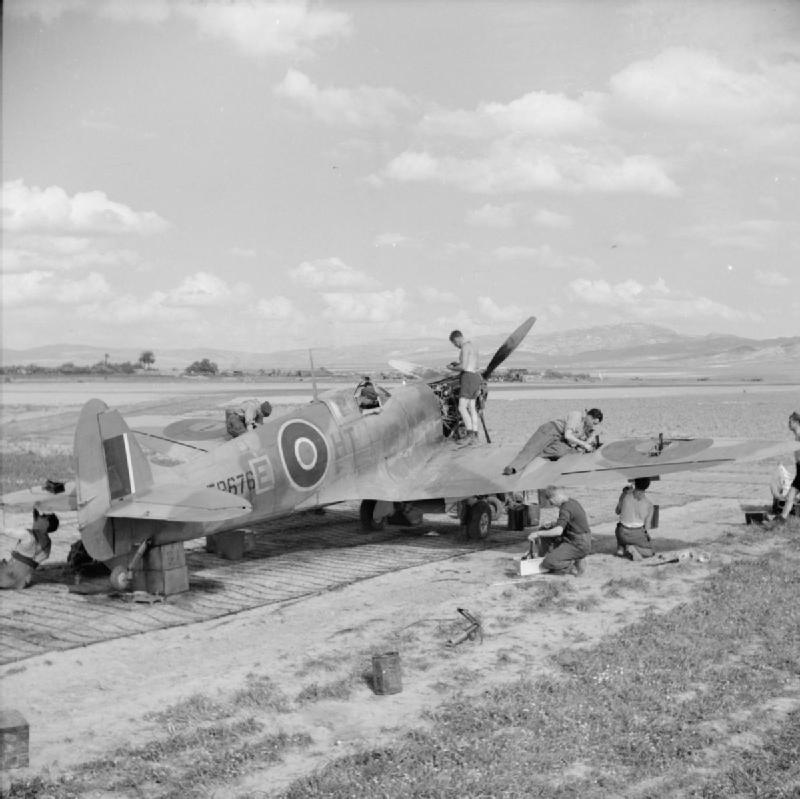FLTLT Dudley Clyde Dunn 409284
DFC



| Squadron/s | 154 SQN RAF |
| Rank On Discharge/Death | Flight Lieutenant (FLTLT) |
| Mustering / Specialisation | Pilot |
| Date of Birth | 09 Jan 1922 |
| Date of Enlistment | 16 Aug 1941 |
| Date of Death | 03 Jan 2007 |
| Contributing Author/s | Alexander Dunn, Paul Carter and David Hamilton, circa 2010 Compiled by Vince Conant February 2014 The Spitfire Association |
Dudley was born in Wagga Wagga on the 9th of January, 1922 and when growing up as one of seven children; knew well the privations and hardships of the Great Depression.
A bright student becoming the dux of his intermediate school and early on, showed that narrow horizons were not in his view. When war was declared in 1939 Dudley joined the RAAF on the 16th of August 1941 and trained as a fighter pilot through the Empire Air Training Scheme. He was seconded to the RAF and travelled to the UK where he went on to fight in the fighter pilot's dream --- the Spitfire.
He flew missions in North Africa Malta, Sicily, Syria, Cyprus, Corsica and Italy. His log books make for fascinating reading. For his 160 combat missions and his "exceptional" skill and courage he was awarded the Distinguished Flying Cross. An abbreviated article is reproduced below:-
In June, 1944, having been seconded from the RAAF I was serving in 154 RAF Squadron based on the East Coast of Corsica flying Spitfires IX's. From our base we could easily cover North and Central Italy and the south of France. At that time there was little enemy air opposition.
We concentrated on road strafing with considerable effect and frustration for the enemy. On the 14th of June, 1944 I was flying number 3 in a section of 4 aircraft briefed to strafe anything that moved on the roads in the Cecina area of Italy.
We shot up a few trucks and staff cars. On the way home I spotted a dust plume blown by a very heavy vehicle. I still had ammunition left so I attacked. I could see strikes on the target. But then all hell broke loose. I was caught in a barrage of very dense and accurate flak.
I was hit in the port aileron but was able to pull away with both hands on the stick and with my left elbow worked the throttle. I didn't like the idea of being taken prisoner so I made for the coast. The old Merlin was vibrating madly with the radiator temperature off the clock and oil pressure approaching zero. I managed to get four miles out to sea, just north of Elba (still occupied by the Germans) when she started smoking and seizing up completely. "Mayday, Mayday, Mayday transmitting for a ‘fix' was my call before being flung out of the cockpit when I stood up and let the stick go.
Everything worked perfectly, the parachute opened, I splashed in and swam away from the parachute towing the packed K type dinghy which was attached to my "Mae West" by a dog-lead - opened the pack and released the CO2 bottle and – Voila !!! - A beautiful little dinghy and all mine!
One of my section climbed up to 8,000 feet and transmitted for an accurate fix. They covered me against any possible nasties until low fuel forced them home. A couple of French Spitfires took over my cover.
I settled back to eat my little packet of rations and worried.
It was close to last light when a Beaufighter arrived, shortly followed by an old Walrus waddling out of the West. The pilot of the Walrus gallantly attempted to alight close to me, despite a heavy 2 metre swell.
Unfortunately he misjudged a bit and struck his port lower wing into a wave. I paddled over to him and climbed aboard. The wing was badly damaged and there was no hope of taking off. The best option was to attempt to taxi 50 odd miles back to Bastia Harbour, Corsica.
It was now dark - I needed a cigarette (mine were a soggy mess) so I asked the Walrus pilot for one - "No Smoking" he replied - "we invade Elba tomorrow and the German E-boats are out". I looked up and beheld our bright orange exhaust flare-tapped on the shoulder and pointed. He shrugged and passed his Players to me. The sea abated a bit as we staggered westwards.
At about 1 a.m. we got a hail and were picked up in a strong light - we feared from an E-boat - but happily is was an RAF HSL (high speed launch) sent out to intercept us.
We took the Walrus in tow. I leapt on board our saviour into some dry gear and a couple of ravishing rums. We then proceeded with the slow tow of that wilting Walrus. We finally arrived in Bastia Harbour about 0930 on a beautiful sunny 15th of June. The battered Walrus was dropped at a mooring and we tied up at the jetty.
Shortly after we were taking breakfast – powdered eggs, of course, on the deck of the HSL when we saw that gallant old Walrus gently sinking at her mooring. We toasted her with tea as she slowly disappeared.
I silently said a prayer of thanks for the stout hearts and the stout aircraft and boats of that magnificent RAF Air Sea Rescue Service.
"The sea shall not have them"
Dudley was discharged 10 January 1946 from No 22 PTC.
When the war was over Dudley joined Qantas flying all over regional Australia, and flew for the Flying Doctor Service. Dudley held many senior managerial positions in Qantas and helped establish Qantas international air travel. On leaving Qantas in about 1960 Dudley pioneered aviation services in airport catering, duty-free industry and serviced the needs of travellers in the flourishing airline travel industry. He then turned his attention to investment in the land and made great contributions to grazing and cropping, establishing the first privately-owned cotton gin.
The September, 2006 Spitfire News carried Dudley Dunn's short story Into the Drink. This edition carries the sad news of the Dudley's passing on 3 January, 2007.
The eulogy delivered by his son Alexander Dunn was a tour de force and testament to the towering individual who was his father.
Another inspirational fighter pilot!

